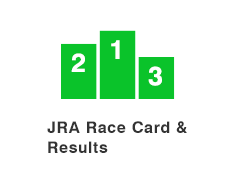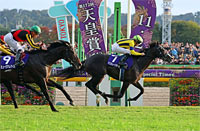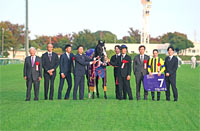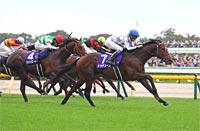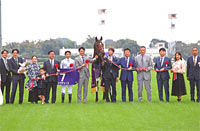2021 News
Tenno Sho (Autumn) (G1) - Preview
Contrail

Gran Alegria

Efforia

Curren Bouquetd'or

World Premiere

You Can Smile

Potager

Tosen Surya

Hishi Iguazu

Persian Knight

Mozu Bello
On the heels of the “Chrysanthemum Prize” comes a classic of a different kind - the international Grade 1 Tenno Sho (Autumn), considered by many to be Japan’s most prestigious race, and held over an especially challenging course. On Sunday, Oct. 31, Tokyo Racecourse hosts the 164th running of the race that has both a spring version and an autumn version, is staged at different venues and over different distances twice every year. The Tenno Sho’s history spans 84 years, with the racing tradition held in at least one of its versions every year since 1937 with only two exceptions. The fall version of the “Emperor’s Prize” is the shorter of the two races and run over the Tokyo 2,000-meter turf course. From the gate there are only 130 meters until the first turn. Early pace tends to be relaxed and late speed is key. In 2020, despite the emergence of two triple crown winners and only a week past Contrail’s conquest of the Kikuka Sho (Japanese St. Leger), the Tenno Sho (Autumn) lineup was not to be upstaged. It sported seven Grade 1 champions and the champion of champions Almond Eye, who chased and claimed her second Tenno Sho (Autumn) victory, then went out with a career-capping Japan Cup win that put her Grade 1 tally at nine. This year sees 16 nominees, aged 3 to 7, five Grade 1 winners and almost all new blood, with only two horses with prior Tenno Sho (Autumn) experience. Contrail is expected to headline the lineup, with five-time G1 champ Gran Alegria and this year’s Satsuki Sho (Japanese 2000 Guineas) winner Efforia considered his biggest rivals. All but three of the runners will carry 58 kg. The sole 3-year-old (Efforia) and the two females (Gran Alegria and Curren Bouquetd’or) will carry 2 kg less. The Tenno Sho is the 11th race on at Tokyo. Post time is 3:40 p.m. Grade 1 winners have won the JPY150 million first-place prize for the past six years. Here’s a look at the field’s standouts. Contrail: Little introduction is needed for this Deep Impact colt. Contrail has figured in winning tickets for his entire career, with only two of nine starts not landing in the winner’s circle. He’s been raced at nothing shorter than 1,800 meters and has two wins at 2,000 meters. It was Almond Eye who handed him his first loss, by a length and a quarter in the 2020 Japan Cup, but no shame for a 3-year-old just crowned Japan’s eighth Triple Crown winner. This year, he returned in April to finish third in the Osaka Hai, most likely hampered by the heavy ground. He goes to the Tenno sho (Autumn) without a sharpener, but, in morning work at Ritto last week with jockey Yuichi Fukunaga, Contrail was already looking razor-ready and poised to scoop his fifth big win. Gran Alegria: Also by Deep Impact, the 5-year-old Gran Alegria has already notched five Grade 1 wins, but unlike Contrail, she has won them all over distances of a mile or less. In fact, she has only been given one outing longer than 1,600 meters, which was the 2,000-meter Osaka Hai on April 4. She finished fourth nearly a full second off the winner, but it may well have been more the heavy ground than the distance that slowed her. The Miho-based Gran Alegria also, however, suffered from a trapped epiglottis (a fold of cartilage at the base of the tongue), which leads to reduced airflow. Over the summer, she underwent surgery and has returned to training as normal, with jockey Christophe Lemaire up for work last week. All systems are reported spot-on. Gran Alegria will be racing for the first time since her second in the Yasuda Kinen at Tokyo on June 6. Efforia: Efforia rose steadily from his winning debut to score the Grade 3 Kyodo News Hai (Tokinominoru Kinen), then go on to victory in the 3-year-old classic Satsuki Sho early this year. It was in the Tokyo Yushun (Japanese Derby) that he suffered his first lost, a frustrating second by a nose. He returns to the track for the first time since the May 30 Derby and, with three wins at the distance, and a 1-1-2 at Tokyo, the only question is whether he’s race-ready. His workouts have all gotten high marks, including a powerful six furlongs under jockey Takeshi Yokoyama last week over the Miho woodchip flat. This will be the colt’s first time up against older horses, but at 510 kg in the Japanese Derby, he’ll likely outweigh the rest of the field and be, at least in size, no pushover. Sire Epiphaneia finished sixth in the 2014 Tenno Sho (Autumn), only 0.2 seconds off the winner. The 22-year-old Yokoyama, who rode Efforia in the Satsuki Sho and Titleholder in last week’s Kikuka Sho, chases his third big win of the year in his first Tenno Sho (Autumn). Curren Bouquetd’or: The 6-year-old daughter of Deep Impact returns from a fourth in the Grade 1 Takarazuka Kinen. Though her last win was in April 2019, Curren Bouquetd’or finishes consistently in the top three. In fact, it’s rare she doesn’t figure in the returns. She has made the board in all her 16 starts (only four were not graded stakes), and missed the top three only four times. Raced predominately at distances longer than 2,000 meters (her last start at 2,000 was the 2019 Shuka Sho), her consistency nonetheless makes her a shoo-in for a trio on Sunday. She is 2-3-4-1-2-2-4 at Tokyo, with the 2020 Japan Cup being her most recent Tokyo run. Her fourth was close, only 0.2 seconds behind Almond Eye, who was also her stablemate. If she can win the Tenno Sho (Autumn), she’ll give trainer Sakae Kunieda his third straight victory in the race. Jocley Keita Tosaki, who just rode Kunieda’s Akaitorino Musume to a win of the Shuka Sho, is pegged for the ride. World Premiere: Another Deep Impact progeny, the 5-year-old World Premiere aced the Tenno Sho (Spring), a marathon of 3,200 meters, this year at Hanshin. Another very consistent runner, the 2019 Kikuka Sho winner has not been given 2,000 meters since early 2019, seven starts ago. In his only run to the left, World Premiere finished sixth in last year’s Japan Cup 0.8 seconds off Almond Eye. Not one to be bothered by a change in venue or distance, World Premiere did race at 1,800-2,000 meters early in his career and recorded 1-3-1-2. * * * Others to watch are: You Can Smile finished fourth here in 2019 and prefers more distance, but his sixth-place finish in the Grade 2 Sapporo Kinen in August should see him improved.
|
|






